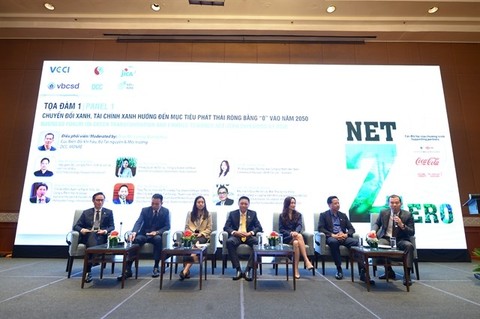
Participants at the forum. — VNS Photo
Transitioning to a sustainable business model is no longer a “fashionable shirt” for businesses, but has become a necessary condition for businesses to improve competitiveness, resilience and be able to meet the requirements of international economic integration.
Nguyễn Tiến Huy, Director General of the Office for Business Sustainable Development (VCCI), made the statement at a business forum on green transition and finance towards net-zero emissions by 2050 held in Hà Nội on Thursday.
The event was jointly held by the Việt Nam Business Council for Sustainable Development (VBCSD) under VCCI, the Ministry of Natural Resources and Environment (MONRE), and the Japan International Co-operation Agency (JICA), bringing together hundreds of representatives from ministries, agencies, organisations and businesses.
“One of the priorities of VBCSD-VCCI is to develop and operate working groups on green transformation, Environmental, Social and Governance (ESG) and green finance, replicating these models widely and contributing additional policy recommendations to improve the legal framework supporting sustainable business development,” Huy added.
Following the renewed commitment of the global community towards Paris alignment at the COP28 Dubai in 2023, along with progressive effort of Việt Nam in steadily implementing the Paris Agreement through key legal frameworks, this business workshop brought together members of key government, business and investment communities for peer-to-peer sharing of the most updated legal regulation on emission reduction, corporate experiences towards net zero, and to discuss concrete opportunities for enabling green transformation in Việt Nam.
Nguyễn Tuấn Quang, MoNRE’s Deputy Director of the Department of Climate Change, said that Việt Nam has committed to achieving net-zero emissions at COP 26 and has joined the Just Energy Transition Partnership (JETP).
“Việt Nam is dedicated to attracting green financial flows for the development of renewable energy and low-carbon initiatives. To fulfil these commitments, the Government has been actively implementing practical solutions,” Quang said.
Việt Nam aims to reduce greenhouse gas emissions by 43.5 per cent by 2030 compared to the standard development scenario, with international support. Currently, Việt Nam is executing the Green Growth Strategy and the National Strategy on Climate Change until 2050. Additionally, the implementation plan for the National Power Development Plan VIII and the JETP plan are underway. In the agricultural sector, Việt Nam is rigorously carrying out a project to cultivate one million hectares of high-quality rice, aiming to decrease greenhouse gas emissions. Numerous policies are also being revised in this regard.
He added that in order to achieve the target of reducing greenhouse gas emissions, according to World Bank’s estimates, Việt Nam need resources amounting to US$386 billion from now until 2040, which is nearly equivalent to one year's GDP. Given this challenge and the available resources, co-operation from the entire political system and the business community is imperative.
Naoki Ikenoya from JICA Vietnam affirmed that the agency will continue its close cooperation with the Vietnamese Government and the private sector to accelerate green transition in the country.
On this occasion, the sides also approved the “Support for Planning and Implementation of the Nationally Determined Contributions in Việt Nam” (SPI-NDC) project.
The forum provided updates on Việt Nam’s policies regarding greenhouse gas emission reduction, and specific opportunities that would support the country’s green transition.
The speeches presented at the forum highlighted the Vietnamese Government’s continuous efforts to create a more favourable policy environment as well as the business circle’s role in cutting greenhouse gas emissions. — VNS